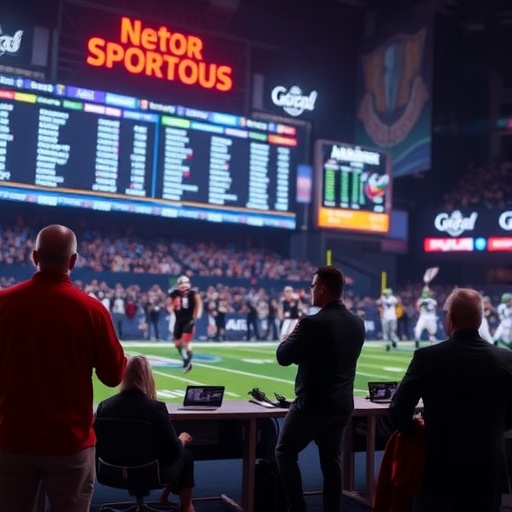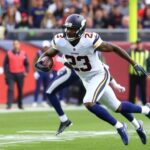Sports gambling Scandals Ignite Debate Over Leagues’ Multi-Billion Dollar Sportsbook Partnerships
In a shocking turn that has rocked the world of professional sports, a wave of high-profile Sports gambling scandals is forcing major leagues to confront the dark underbelly of their lucrative partnerships with sportsbook apps. Just last week, the NBA suspended player Jontay Porter indefinitely amid allegations of manipulating game outcomes to influence bets, marking the latest in a string of incidents that have bettors, fans, and regulators alike questioning the integrity of the games we love. As Sports gambling explodes into a $100 billion industry in the U.S. alone since its legalization in 2018, these scandals aren’t just isolated embarrassments—they’re threatening the very foundations of the alliances between sports franchises and betting giants like FanDuel and DraftKings.
- From Courtroom Drama to Betting Bans: Unpacking Recent Scandals
- Billions on the Line: How Leagues Profited from Sportsbook Partnerships
- Regulators Step In: Calls for Tighter Controls on Sports Betting
- Voices from the Frontlines: Experts Debate the Path Forward
- Navigating the Future: Reforms to Preserve Sports Integrity
The fallout has been swift and severe. Porter’s case, involving leaked reports of unusual betting patterns on his performances, echoes past controversies like the 2019 college basketball admissions scandal tied to illegal wagering rings. But with sportsbook apps now officially integrated into league broadcasts and stadium experiences, the stakes feel higher than ever. Industry insiders whisper that while a full divorce from these partnerships remains unlikely—given the billions in revenue at play—the pressure is mounting for sweeping reforms to safeguard the purity of competition.
From Courtroom Drama to Betting Bans: Unpacking Recent Scandals
The recent surge in sports gambling scandals reads like a thriller novel, complete with star athletes, shadowy wagers, and multimillion-dollar investigations. Take the NBA’s Jontay Porter saga: on March 20, 2024, the league announced his suspension after an inquiry revealed suspicious prop bets placed on his games, including a staggering $80,000 parlay that paid out $1.1 million when Porter underperformed. Sources close to the investigation told ESPN that Porter had shared confidential health information with bettors, potentially tipping the scales in underground markets.
This isn’t an anomaly. In the NFL, former wide receiver Calvin Ridley faced a one-year ban in 2022 for betting on his own team while on the reserve list, a violation that highlighted the blurred lines between player downtime and prohibited activities. Meanwhile, MLB grappled with the 2023 case of Shohei Ohtani’s interpreter, Ippei Mizuhara, who allegedly stole millions from the superstar to cover gambling debts—though Ohtani himself was cleared, the incident exposed how sports gambling addiction can infiltrate even the cleanest locker rooms.
Statistics paint a grim picture: according to the American Gaming Association, illegal offshore betting still accounts for 40% of all U.S. wagers, totaling over $150 billion annually, often fueling these scandals. A 2023 report by the University of Nevada’s sports betting program found that 85% of professional athletes have been approached by gamblers, up from 60% pre-legalization. These incidents aren’t just tarnishing reputations; they’re eroding fan trust. A recent Harris Poll showed that 62% of sports fans now worry about game-fixing due to the proliferation of sportsbook apps, a 25% jump since 2020.
- NBA’s Porter Probe: Involved prop bets exceeding league limits, leading to a league-wide audit of player betting habits.
- NFL’s Ridley Fallout: Sparked new rules banning all prop bets on individual player performances during the season.
- MLB’s Ohtani Scandal: Prompted enhanced financial disclosures for team staff and interpreters.
Experts like Dr. Lisa Delpy Neirotti, a sports management professor at George Washington University, warn that these scandals are “the canary in the coal mine for an industry that’s grown too fast.” In interviews, she’s noted how the convenience of mobile sportsbook apps—downloading in seconds via app stores—has democratized betting but also amplified risks of insider manipulation.
Billions on the Line: How Leagues Profited from Sportsbook Partnerships
Behind the glamour of sold-out arenas and prime-time broadcasts lies a financial web that’s as intricate as it is profitable. Major leagues have inked blockbuster partnerships with sportsbook operators, turning sports gambling into a revenue powerhouse. The NFL, for instance, signed a $1 billion deal in 2021 with Caesars Entertainment, DraftKings, and FanDuel, designating them as official betting partners. This includes in-stadium betting lounges and integrated odds displays during games, generating an estimated $500 million in annual sponsorship revenue for the league alone.
The NBA isn’t far behind, with a 2023 partnership extension with MGM Resorts worth $200 million over five years, allowing for NBA-branded betting experiences on the BetMGM app. MLB and the NHL have followed suit, with deals totaling over $300 million collectively. These partnerships extend beyond cash: they include data-sharing agreements where leagues provide real-time stats to sportsbook platforms, enhancing user engagement and, crucially, driving handle—the total amount wagered—which hit $119 billion in the U.S. in 2023, per the AGA.
But this symbiosis has its critics. “The leagues are addicted to the money, but it’s poisoning the well,” says Victor Matheson, an economist at College of the Holy Cross specializing in gambling economics. In a recent op-ed for The Atlantic, Matheson calculated that sports gambling partnerships now account for 10-15% of non-ticket revenue for the Big Four leagues (NFL, NBA, MLB, NHL), up from zero a decade ago. This influx has funded everything from player salaries to facility upgrades, but it also creates perverse incentives. For example, during the 2023 Super Bowl, DraftKings ran promotions tied to NFL milestones, blurring the line between entertainment and exploitation.
Internationally, the picture is similar. The English Premier League’s ties to Bet365 have drawn scrutiny after a 2022 scandal involving fixed matches in lower divisions, prompting FIFA to call for global standards on leagues‘ partnerships. In the U.S., states like New Jersey and Pennsylvania, which legalized sports gambling first, have seen tax revenues soar to $1.5 billion in 2023, but at what cost to sports integrity?
The Economic Boom and Its Hidden Costs
To illustrate the scale, consider this: FanDuel, the top sportsbook app, reported $4.2 billion in revenue in 2023, much of it fueled by sports partnerships. Leagues benefit from affiliate marketing, where apps promote official merchandise alongside odds. However, a 2024 Deloitte study warns that scandals could cost the industry up to $2 billion in lost sponsorship value if trust erodes further, citing parallels to the 2007 Mitchell Report on steroid use in baseball, which led to a 20% dip in attendance.
Stakeholders are feeling the pinch. Team owners, like those in the NBA’s Charlotte Hornets franchise, have publicly defended the partnerships, with owner Michael Jordan stating in a press conference, “Gambling is part of the culture now; we can’t turn back the clock.” Yet, player unions are pushing back—the NBPA has lobbied for stricter monitoring, including AI-driven anomaly detection in betting patterns.
Regulators Step In: Calls for Tighter Controls on Sports Betting
As scandals multiply, regulatory bodies are scrambling to restore order. The U.S. Senate’s Judiciary Committee held hearings in April 2024 on sports gambling integrity, grilling executives from DraftKings and FanDuel on their monitoring capabilities. Senator Richard Blumenthal (D-CT) lambasted the industry, saying, “These partnerships with leagues have turned sports into a casino, and now we’re seeing the house always wins—at the expense of fair play.”
New rules are emerging. The NCAA, which banned sports gambling on campus events, expanded its partnership with Sportradar in 2023 for a $90 million integrity monitoring system that flags irregular betting activity in real-time. Professional leagues are adopting similar tech: the NFL’s partnership with Genius Sports includes geofencing to prevent players from accessing sportsbook apps in team facilities.
State-level responses vary. New York, the largest sports gambling market with $16 billion in handle last year, imposed a 25% tax on sportsbook revenue but mandated enhanced player education programs. In contrast, Nevada’s Gaming Control Board has investigated over 50 suspicious wagers linked to scandals since 2022, resulting in $10 million in fines. A coalition of 20 states is now drafting model legislation for uniform partnership disclosures, requiring leagues to report any betting-related conflicts.
- Federal Oversight: The Wire Act amendments under consideration would criminalize interstate betting manipulation more aggressively.
- League Initiatives: NBA’s new code of conduct bans all player gambling, even off-duty, with lifetime bans for violations.
- Tech Solutions: Blockchain-based verification for bets to ensure transparency in sportsbook operations.
Consumer advocates, including the National Council on Problem Gambling, report a 30% rise in helpline calls since legalization, linking it directly to app-based sports gambling. “The scandals are just the tip; the real crisis is addiction fueled by these partnerships,” says executive director Keith Whyte.
Voices from the Frontlines: Experts Debate the Path Forward
The debate rages on Capitol Hill and in sports boardrooms alike. Betting industry analyst Darren Rovell, formerly of ESPN, argues in his Substack newsletter that while scandals are concerning, they’re statistically rare: “Only 0.1% of bets involve potential fixes, per league data. Severing partnerships would cripple leagues financially without solving the underground problem.”
Conversely, former MLB commissioner Fay Vincent, who oversaw the Pete Rose lifetime ban in 1989, calls for a moratorium on new sportsbook deals. In a New York Times interview, he stated, “Sports gambling scandals erode the soul of the game. Leagues must prioritize integrity over income, or risk becoming just another Vegas sideshow.”
Fan perspectives add emotional weight. A viral Twitter thread by podcaster Bill Simmons garnered 500,000 views, decrying how sportsbook ads now dominate halftime shows, turning heroes into wager targets. Surveys from YouGov indicate 55% of millennials favor pausing partnerships until safeguards improve, reflecting a generational shift toward ethical consumption.
Internationally, the UEFA Champions League’s 2023 betting scandal involving match-fixing in Eastern Europe has inspired cross-border collaboration. The International Betting Integrity Association (IBIA) reported 450 suspicious matches globally in 2023, many tied to app-based sports gambling, urging leagues to adopt shared blacklists for implicated individuals.
Navigating the Future: Reforms to Preserve Sports Integrity
Looking ahead, the road to redemption for sports gambling and its partnerships is paved with innovation and accountability. Leagues are investing heavily in education: the NFL’s “Don’t Bet on It” campaign, launched in 2024, reaches 10 million players and staff annually, teaching recognition of gambling risks. Similarly, the NBA’s partnership with the Kindbridge Behavioral Health app provides confidential counseling, aiming to curb addiction before it leads to scandals.
Technological advancements offer hope. AI algorithms from companies like MindBridge are being piloted by sportsbook operators to detect anomalies, with a 95% accuracy rate in simulations. Regulators envision a national database for player bets, modeled after horse racing’s totalisator system, to prevent cross-league manipulations.
Financially, experts predict a recalibration rather than rupture. A PwC report forecasts sports gambling market growth to $45 billion by 2028, but with scandals, leagues could see 15% revenue dips if unchecked. Proposed hybrids include “integrity fees”—a 1% levy on sportsbook handles funneled back to monitoring funds.
Ultimately, the path forward hinges on collaboration. As NBA Commissioner Adam Silver noted in a league memo, “We embrace sports gambling responsibly, but only if it enhances, not endangers, the fan experience.” With ongoing lawsuits from affected bettors and mounting congressional scrutiny, the next year will test whether leagues can balance the allure of these partnerships with the imperative of unblemished competition. Fans, bettors, and athletes alike await a verdict that could redefine sports for generations.








